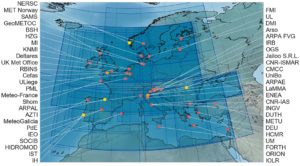The major interface between humans and the ocean occurs in the coastal seas. Marine industries thrive in this area while European citizens make daily use of the coastal ocean for tourism, leisure or recreation. Operational oceanography assists both industry and the general public to make decisions about their use of and access to the coastal ocean.
The EuroGOOS Coastal Working Group will examine the entire value chain from coastal in situ observations, satellite data, ocean forecasts and analysis, to products and services for coastal users. The working group will examine sustainability and fitness for purpose of the existing system and identify future steps needed to secure and improve all elements of the coastal value chain to better serve end users and stakeholders.
The Coastal Working Group builds upon initiatives already completed or underway that have focused on coastal observing, modelling and the generation of products and services. These include, but are not limited to, the work of the JERICO-RI, activities within EuroGOOS working groups, task teams, and the five regional operational oceanographic systems (ROOS). Activities are also aligned with the EuroGOOS 2030 strategy.
List of Members
Co-Chairs
- Ghada El Serafy, Deltares, Netherlands
- Arthur Capet, University of Liège (ULiège), Belgium
Members
- Angelique Melet, Mercator Ocean International (MOi), France
- Anna Rubio, Fundación AZTI, Spain
- Antonello Bruschi, Italian National Institute for Environmental Protection and Research (ISPRA), Italy
- Antti Westerlund, Finnish Meteorological Institute (FMI), Finland
- Baptiste Mourre, Spanish National Research Council (CSIC), Spain
- Dougal Lichtman, National Oceanography Centre (NOC), United Kingdom
- Emma Huijben, Deltares, Netherlands
- Enrico Baglione, National Institute of Geophysics and Volcanology (INGV), Italy
- Federico Falcini, National Research Council of Italy (CNR), Italy
- Fernando Manzano, Puertos del Estado, Spain
- Francisco Campuzano, +ATLANTIC Colab, Portugal
- Georg Umgiesser, National Research Council of Italy (CNR), Italy
- Guillaume Charria, French Research Institute for Exploitation of the Sea (Ifremer), France
- Helene Frigstad, Norwegian Institute for Water Research (NIVA), Norway
- Ivane Pairaud, French Research Institute for Exploitation of the Sea (Ifremer), France
- Joanna Staneva, Helmholtz-Zentrum Hereon, Germany
- Joaquín Tintoré, The Balearic Islands Coastal Ocean Observing and Forecasting System (SOCIB), Spain
- Jun She, Danish Meteorological Institute (DMI), Denmark
- Katrijin Baetens, Royal Belgian Institute of Natural Sciences (RBINS), Belgium
- Laura Tuomi, Finnish Meteorological Institute (FMI), Finland
- Laura Ursella, National Institute of Oceanography and Experimental Geophysics (OGS), Italy
- Lorinc Meszaros, Deltares, Netherlands
- Marcos García Sotillo, Nologin, Spain
- Øyvind Sætra, Norwegian Meteorological Institute (MET Norway), Norway
- Rosemarie Lawlor, Irish Meteorological Service (Met Éireann), Ireland
- Sebastien Legrand, Royal Belgian Institute of Natural Sciences (RBINS), Belgium
- Tomasz Dabrowski, Marine Institute (MI), Ireland
Terms of Reference
Contributions
OceanPrediction Atlas Forecasting systems
Outcomes
1. Assessment of operational modeling capacities
The EuroGOOS Coastal Working Group conducted a survey on the operational modelling capacities in the European seas. An analysis derived from the survey, published in Frontiers in Marine Science Journal, drew on contributions from 49 organizations across Europe to assess the current operational modelling capacities and services. The article examined the gaps, needs, and priorities for improving the marine and coastal operational modeling capacity and put forth a number of recommendations. Read the full study here.
2. EEA Copernicus In situ coordination project (COINS)
Members of the Working group have participated in the EEA Copernicus In situ coordination project (COINS) and have produced a series of reports on the availability of Biogeochemical observations on the coastal areas (Inventory of existing European Biogeochemical observations) and on the Copernicus requirements for biogeochemistry essential ocean variables in the coastal ocean.
3. FORCOAST Central Platform
Members of the Coastal WG have participated in the Copernicus uptake EU project FORCOAST which is aiming to provide information services, co-designed with stakeholders, which provide high-resolution data of water quality and met-ocean variables at coastal zone and nearshore that are used to give focused answers to specific questions from the targeted wild fisheries, bivalve mariculture, and oysterground restoration sectors.
A main outcome of the Project is a Central Platform where all the coastal data services developed in seven pilots sites can be accessed and run in real time. You can access the Central Platform here.
















































